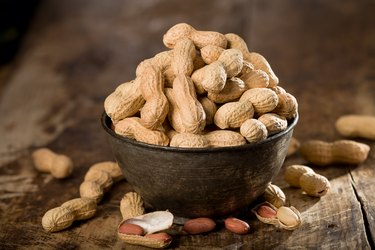
Almost everyone gets a headache now and then. While unpleasant, in most cases they're short-lived. But if your headaches are a frequent occurrence, it may be time to look for lifestyle triggers, including those in your diet.
Peanuts Headache or Walnut Headache?
Video of the Day
According to experts at the Cleveland Clinic, about a fifth of all headaches are triggered by food. Much of the research exploring exact food-headache connections remains inconclusive. That's because studies often rely on participants' journals and reports rather than scientific testing. But what we do know from this research is that the list of possible food culprits is quite long. It includes dozens of common—and popular—foods.
Video of the Day
The "smoking gun" behind your headache? It could be aged cheeses, chocolate, coffee, alcohol, seeds, nuts and peanuts, which is technically a legume, the Cleveland Clinic reports. But it could also be something harder to uncover, like an ingredient in a prepared food, from the yeast in breads and other baked goods to preservatives, like nitrates and nitrites.
Cleveland Clinic even cites these surprising food culprits:
- Fermented foods, like pickles
- Citrus fruits, bananas and raspberries
- Organ meats and foods made with them, like pate
- Garlic and onions
- Avocado
How can you tell if it's a food that's behind the pounding in your head? One possibility is if it develops within 20 minutes to 2 hours after consuming a particular drink or food, Cleveland Clinic notes. However, the process of uncovering the true culprit is complicated by the fact that headaches can also be caused by dehydration, changes in the weather, not getting enough sleep and even exercise. Pinpointing a guilty food source will take some effort.
Read more: No-Carb Headache
Monitor Your Diet for Trouble
Doing some detective work can be helpful, experts say, especially if you get painful, often debilitating migraines, which many sufferers find can be triggered by foods.
"A healthy, more plant-based, less processed-food approach to eating may be helpful," especially for migraine sufferers, says Samantha Heller, RD, a senior clinical nutritionist with NYU Langone Health in New York City. "This reduces exposure to chemicals used in highly processed foods, which for some can be problematic."
She adds: "Patients who suffer from migraines should keep a detailed food and symptom diary to see if they can connect the dots between certain foods, or ingredients in foods, and the onset of a migraine."
Read more: Can Sugar Cause Headaches?
Trouble with Tyramine, Caffeine, Nitrates and Sulfites
But Heller also points out that anyone can be sensitive to the amino acid tyramine, which can send blood pressure soaring and trigger nausea and, ultimately, a pounding in your skull. It's the reason many foods are on the problem list. Tyramine can be found in chocolate, peanuts, pumpkin and sesame seeds, walnuts and pecans as well as cheeses like cheddar, brie, blue, Swiss, Stilton, Roquefort, mozzarella and provolone, says the National Headache Foundation. And the list goes on,
For those sensitive to caffeine, coffee and tea may also be a headache no-go zone, alongside chocolate, which also has the stimulant in it. The National Headache Foundation's low-tyramine diet lists these foods and beverages on its "Use With Caution" list. If you are prone to having migraines, limiting you caffeine intake to 200 milligrams a day (about one of two cups of coffee) is a good idea, says the American Migraine Foundation. The amount you can safely consume may depend on how sensitive you are to caffeine's effects.
Reading labels on packaged foods and wine is essential because your headache trigger could be the nitrates used to cure bacon or preserve smoked fish, or the MSG used for added flavor. "In the case of wine, it is likely a reaction to the sulfites found in some wines but not others," says Lona Sandon, PhD, RDN, an associate professor in clinical nutrition at the University of Texas Southwestern Medical Center in Dallas. "Some of these compounds found in foods may cause constriction of blood vessels that lead to headaches. But, the triggering mechanisms are still not completely understood."
What is understood is that the average person should not live in fear that a headache is but one meal away. "Most people," Sandon says, "can eat these foods just fine without any problems."
Is this an emergency? If you are experiencing serious medical symptoms, please see the National Library of Medicine’s list of signs you need emergency medical attention or call 911.